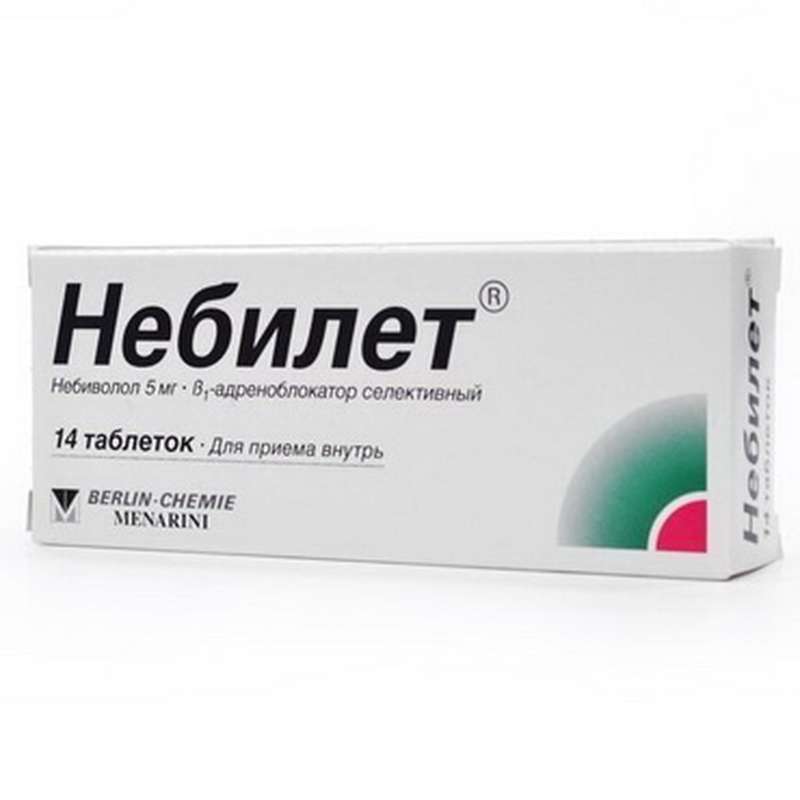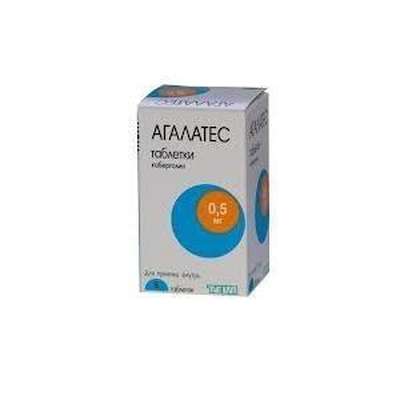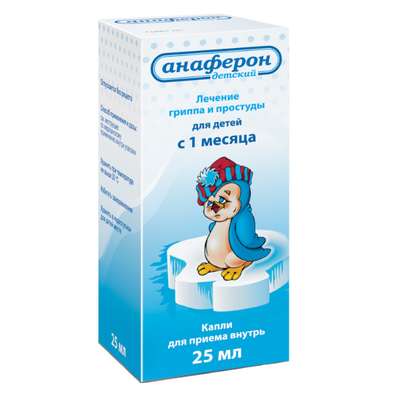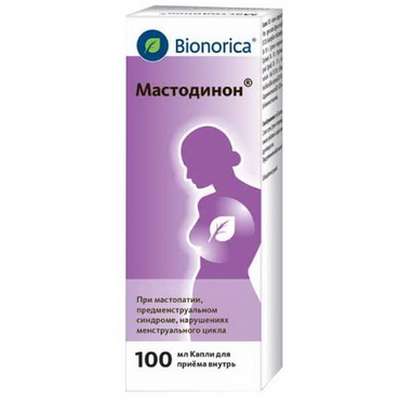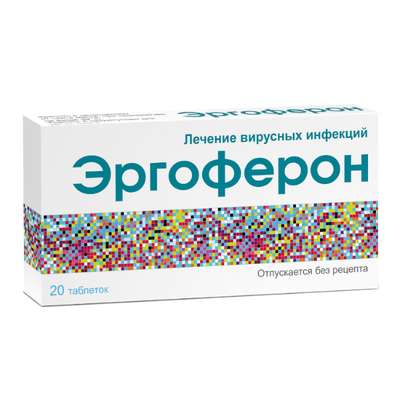Nebilet - Cardioselective beta-1 blocker. Has antihypertensive, anti-anginal and antiarrhythmic effect. Reduces elevated blood pressure at rest, with physical stress and stress. Competitively and selectively block postsynaptic β1-adrenergic receptors, making them inaccessible to catecholamines, modulating the release of endothelial vasodilating factor nitric oxide (NO).
Nebivolol is a racemate of two enantiomers: SRRR-nebivolol (D-nebivolol) and RSSS-nebivolol (L-nebivolol), which combines two pharmacological actions:
-D-nebivolol is a competitive and highly selective blocker of β1-adrenergic receptors;
-L-nebivolol has a mild vasodilating effect due to the modulation of the release of the vasodilating factor (NO) from the vascular endothelium.
The hypotensive effect is also due to a decrease in the activity of the renin-angiotensin-aldosterone system (RAAS) (does not directly correlate with a change in renin activity in the blood plasma).
A stable hypotensive effect develops after 1-2 weeks of regular intake of the drug, and in some cases - after 4 weeks, a stable effect is observed after 1-2 months.
Reducing the need for myocardium in oxygen (decreasing heart rate and reducing preload and afterload), reduces the number and severity of angina attacks and increases the tolerance of exercise.
Antiarrhythmic effect due to suppression of pathological automatism of the heart (including in the pathological focus) and slowing AV-conduction.
Indications:
- Arterial hypertension;
- ischemic heart disease: prevention of angina pectoris attacks;
- chronic heart failure (as part of combination therapy).
Contraindications:
- Hypersensitivity to nebivolol or one of the components of the drug;
- acute heart failure;
- chronic heart failure in the stage of decompensation (requiring intravenous administration of drugs with inotropic effect);
- severe arterial hypotension (systolic blood pressure less than 90 mm Hg);
- SSSU, including the sinoatrial blockade;
- AV-blockade II and III degree (without an artificial rhythm driver);
- bradycardia (heart rate less than 60 beats per minute);
- cardiogenic shock;
- pheochromocytoma (without simultaneous use of alpha-blockers);
- metabolic acidosis;
- severe liver dysfunction;
- bronchospasm and bronchial asthma in history;
- severe obliterating diseases of peripheral vessels (intermittent claudication, Raynaud's syndrome);
- myasthenia gravis;
- depression;
- lactose intolerance, lactase deficiency and glucose malabsorption / galactose syndrome;
- children and adolescents under 18 years of age (efficacy and safety not studied).
Caution should be applied to the drug: with kidney failure, diabetes, thyroid gland hyperthyroidism, history of allergies, psoriasis, chronic obstructive pulmonary disease, grade I AV block, Prinzmetal angina, and patients older than 75 years.
Suggested Use:
Tablets are taken orally, 1 time / day, preferably always at the same time of the day, regardless of food intake, with a sufficient amount of liquid.
The average daily dose for the treatment of hypertension and arterial hypertension is 2.5-5 mg (1 / 2-1 tab.). Nebilet can be used in monotherapy or in combination with other means that reduce blood pressure.
In patients with renal insufficiency, as well as in patients over the age of 65, the recommended initial dose is 2.5 mg (1/2 tab.) / Day. If necessary, the daily dose can be increased to a maximum of 10 mg (2 tablets of 5 mg per 1 dose).
Treatment of chronic heart failure should begin with a slow increase in the dose until an individual optimal maintenance dose is reached. Selection of the dose at the beginning of treatment should be carried out according to the following scheme, while maintaining intervals of 1 to 2 weeks and based on the tolerance of this dose to the patient: a dose of 1.25 mg nebivolol (1/4 tablets of 5 mg) 1 time / day can be increased first to 2.5-5 mg (1/2 tablets of 5 mg or 1 table, 5 mg), and then to 10 mg (2 tablespoons of 5 mg) once a day.
The maximum daily dose is 10 mg 1 time / day.
At the beginning of treatment and at each dose increase, the patient should be under the supervision of a doctor for at least 2 hours to ensure that the clinical condition remains stable (especially, blood pressure, heart rate, conduction disorders, and symptoms of worsening of chronic heart failure).
Rules for the division of tablets
For division, place the tablet on a firm, level surface with a cross-shaped notch up, press the tablet with both index fingers. To obtain 1/4 tablets, repeat the same procedure with 1/2 tablet.
Special instructions:
The abolition of beta-blockers should be carried out gradually within 10 days (up to 2 weeks in patients with ischemic heart disease).
Control of blood pressure and heart rate at the beginning of the drug should be daily.
Older patients need control of kidney function (1 time in 4-5 months).
With angina pectoris, the dose of the drug should provide a heart rate at rest within 55-60 beats / min, with a load - no more than 110 beats per minute.
Beta-adrenoblockers can cause bradycardia: the dose should be reduced if the heart rate is less than 50-55 bpm.
When deciding whether to use Nebilet in patients with psoriasis, the expected benefits of using the drug and the possible risk of exacerbation of psoriasis should be carefully correlated.
Patients using contact lenses should take into account that the use of beta-blockers may reduce the production of tear fluid.
When conducting surgical interventions, an anesthesiologist should be warned that the patient is taking beta-blockers.
Nebivolol does not affect the concentration of glucose in the blood plasma in patients with diabetes mellitus. However, care should be taken in the treatment of these patients, since Nebelet can mask certain symptoms of hypoglycemia (eg, tachycardia) caused by the use of hypoglycemic agents for ingestion and insulin. Controlling the concentration of glucose in the blood plasma should be done 1 time in 4-5 months (in patients with diabetes mellitus).
With hyperthyroidism, beta-adrenoblockers can mask tachycardia.
Beta-adrenoblockers should be used with caution in patients with chronic obstructive pulmonary disease, as bronchospasm may increase.
Beta-adrenoblockers can increase sensitivity to allergens and the severity of anaphylactic reactions.
Impact on the ability to drive vehicles and other mechanisms that require increased concentration
The effect of Nebilet on the ability to drive vehicles and control mechanisms has not been specifically studied. Studies of the pharmacodynamics of nebivolol have shown that the drug Nebilet has no effect on the psychomotor function. During the period of treatment with Nebilet (if side effects occur), care should be taken when driving vehicles and when engaging in potentially dangerous activities that require a high concentration of attention and speed of psychomotor reactions.
Overdose:
Symptoms: marked decrease in blood pressure, nausea, vomiting, cyanosis, sinus bradycardia, AV blockade, bronchospasm, loss of consciousness, cardiogenic shock, coma, cardiac arrest.
Treatment: gastric lavage, reception of activated charcoal. In the case of a marked decrease in blood pressure, it is necessary to give the patient a horizontal position with raised legs, if necessary, with / injection of liquid and vasopressors. When bradycardia should be administered iv in 0.5-2 mg of atropine, in the absence of a positive effect, a transvenous or intracardiac electrostimulator can be staged. With AV-blockade (II-III st.), It is recommended to inject beta-adrenostimulants intravenously, if they are ineffective, consider setting up an artificial pacemaker. With heart failure treatment begins with the introduction of cardiac glycosides and diuretics, in the absence of effect, it is advisable to administer dopamine, dobutamine or vasodilators. When bronhospazme apply in / in stimulants of β2-adrenoreceptors. When ventricular estrasystole - lidocaine (you can not inject antiarrhythmic drugs IA class).
Packaging:
- Comes in original packaging. Item is brand new and unopened.
Storage:
- Keep away from direct sunlight.
- Keep locked and away from children.
- Store in dry place at room temperature.
- Do not exceed storage temperature higher than 25 C
Important notice- the outer box design may vary before prior notice!

 Cart
Cart
